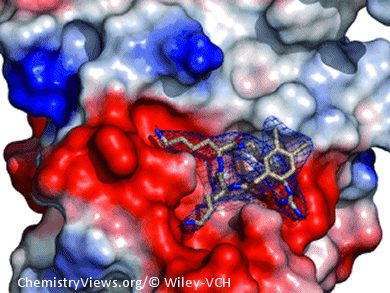The West Nile virus (WNV) is a mosquito-borne flavivirus that has spread to various regions of Africa, Asia, North America, and Europe. A subset of infected people, mostly children and the elderly, can develop fatal meningitis or encephalitis. Despite increasing demand, there is as yet no available specific treatment or human vaccine for WNV infections.
The WNV RNA genome is translated into a polyprotein that must be processed into structural and nonstructural proteins by cellular host proteases and the viral NS2B-NS3 protease. Therefore, the NS2B-NS3 protease has emerged as a potentially suitable target for the treatment of WNV infections. So far, only few synthetic inhibitors of the WNV protease are known, and the most potent analogues contain a nonspecific and reactive arginal warhead, which limits their further development.
A collaborative research effort led by Torsten Steinmetzer, University of Marburg, Germany, has provided a new series of potent substrate analogue inhibitors of WNV protease that contain an inert decarboxylated arginine mimetic instead of the reactive arginal group. Selectivity measurements revealed an excellent specificity profile for these inhibitors, which possess negligible affinity for several tested trypsin-like serine proteases. For one of the most potent inhibitors, a crystal structure in complex with the WNV protease was solved by the group of Rolf Hilgenfeld at the University of Lübeck, Germany. The inhibitor adopts a horseshoe-like conformation, most likely due to intramolecular hydrophobic contacts, which are further stabilized by a strong intramolecular hydrogen bond. These inhibitors are stable, chemically readily accessible, and may serve as suitable lead structures for further development.
- Development and Characterization of New Peptidomimetic Inhibitors of the West Nile Virus NS2B–NS3 Protease,
M. Z. Hammamy, C. Haase, M. Hammami, R. Hilgenfeld, T. Steinmetzer,
ChemMedChem 2013, 8(02).
DOI: 10.1002/cmdc.201200497




